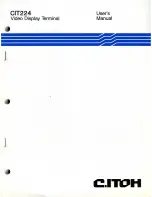
MAINTENANCE
61
12/154
DRAIN LOCATIONS
1. Separator tank drain.
2. Engine coolant drain.
3. Engine oil drain.
4. Compressor coolant drain.
5. Fuel tank drain.
Ensure the compressor is stopped and all pressure is relieved
before draining fluids. Check and close all drain valves, remove the
plug from the drain outlet using the tool provided. Place the empty
container underneath the drain outlet and open the valve. Do not leave
unattended as some fluids will drain very rapidly and could spill.
ROUTINE MAINTENANCE
This section refers to the various components which require
periodic maintenance and replacement.
The
SERVICE/MAINTENANCE CHART
indicates the various
components’ descriptions and the intervals when maintenance is
recommended. Oil capacities, etc., can be found in the
GENERAL
INFORMATION
section of this manual.
For any specification or specific requirement on service or
preventative maintenance for the engine, refer to the
Engine
Manufacturer’s Manual
.
Compressed air can be dangerous if incorrectly handled. Before
doing any work on the unit, ensure that all pressure is vented from the
system and that the machine cannot be started accidentally.
If the automatic blowdown fails to operate, then pressure must be
gradually relieved by operating the manual blowdown valve. Suitable
personal protective equipment should be worn.
Ensure that maintenance personnel are adequately trained,
competent and have read the Maintenance Manuals.
Prior to attempting any maintenance work, ensure that:-
•
all air pressure is fully discharged and isolated from the system. If
the automatic blowdown valve is used for this purpose, then allow
enough time for it to complete the operation.
THIS PRESSURE MUST BE RELIEVED BY CAREFULLY:
(a) DISCONNECTING ANY DOWNSTREAM EQUIPMENT.
(b) OPENING THE DISCHARGE VALVE TO ATMOSPHERE.
(USE HEARING PROTECTION IF NECESSARY).
•
the machine cannot be started accidentally or otherwise, by posting
warning signs and/or fitting appropriate anti-start devices.
•
all residual electrical power sources (mains and battery) are
isolated.
Prior to opening or removing panels or covers to work inside a
machine, ensure that:-
•
anyone entering the machine is aware of the reduced level of
protection and the additional hazards, including hot surfaces and
intermittently moving parts.
•
the machine cannot be started accidentally or otherwise, by posting
warning signs and/or fitting appropriate anti-start devices.
Prior to attempting any maintenance work on a running machine,
ensure that:-
•
the work carried out is limited to only those tasks which require the
machine to run.
•
the work carried out with safety protection devices disabled or
removed is limited to only those tasks which require the machine to
be running with safety protection devices disabled or removed.
•
all hazards present are known (e.g. pressurised components,
electrically live components, removed panels, covers and guards,
extreme temperatures, inflow and outflow of air, intermittently
moving parts, safety valve discharge etc.).
•
appropriate personal protective equipment is worn.
•
loose clothing, jewellery, long hair etc. is made safe.
•
warning signs indicating that Maintenance Work is in Progress are
posted in a position that can be clearly seen.
Upon completion of maintenance tasks and prior to returning the
machine into service, ensure that:-
•
the machine is suitably tested.
•
all guards and safety protection devices are refitted.
•
all panels are replaced, canopy and doors closed.
•
hazardous materials are effectively contained and disposed of.
PROTECTIVE SHUTDOWN SYSTEM
Refer to the Wedge diagnostic display codes table for a listing of
shutdown conditions.
SCAVENGE LINE
The scavenge line runs from the combined orifice/drop tube in the
separator tank, to the orifice fitting located in the airend.
Examine the orifice, check valve and hoses at every service or in
the event of oil carryover into the discharge air.
It is good preventative maintenance to check that the scavenge line
and tube are clear of any obstruction each time the compressor
lubricant is changed as any blockage will result in oil carryover into the
discharge air.
COMPRESSOR OIL FILTER
Refer to the MAINTENANCE CHART in this section for the
recommended servicing intervals.
Removal
WARNING: Use caution when draining fluids as these can be hot
and could cause injury.
NOTE:
Pressure will always remain in the part of the system between
the minimum pressure valve and the discharge valve after operation
of the auto blowdown valve.
WARNING: Do not remove the filter(s) without first making sure
that the machine is stopped and the system has been
completely relieved of all air pressure.
(Refer to
STOPPING THE
UNIT
in the
OPERATING INSTRUCTIONS
section of this manual).
Содержание 12/154
Страница 2: ......
Страница 4: ......
Страница 84: ...80 MACHINE SYSTEMS 12 154 page ...
Страница 86: ...82 MACHINE SYSTEMS 12 154 ...
Страница 88: ...84 MACHINE SYSTEMS 12 154 ...
Страница 90: ...86 MACHINE SYSTEMS 12 154 ...
Страница 92: ...88 MACHINE SYSTEMS 12 154 ...
Страница 94: ...90 MACHINE SYSTEMS 12 154 ...
Страница 101: ...OPTIONS 97 12 154 PRIMARY AND SECONDARY FILTER MAINTENANCE FIGURE 1 FIGURE 2 FIGURE 3 FIGURE 4 FIGURE 5 ...
Страница 102: ...98 OPTIONS 12 154 WATER SEPARATOR MAINTENANCE FIGURE 1 FIGURE 2 FIGURE 3 FIGURE 4 FIGURE 5 FIGURE 6 ...
Страница 108: ......
















































